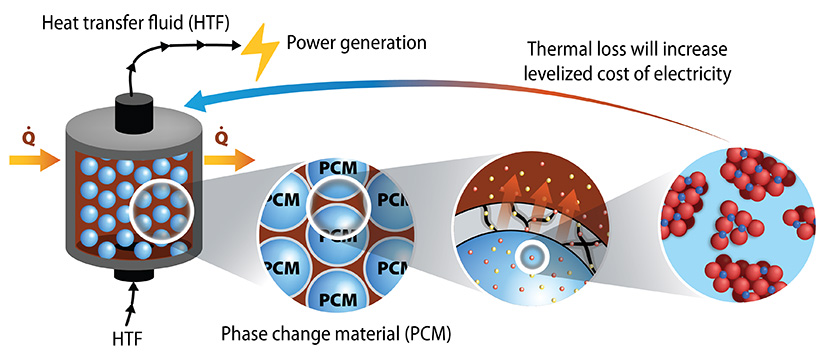About
Through scientific collaboration, the DEGREES Energy Earthshot Research Center enables new strategies for thermal energy storage material (TESM) degradation control to advance electrothermal long-duration energy storage (LDES).
A resilient, flexible, and decarbonized electric grid requires LDES capable of power output exceeding hundreds of megawatts, storage duration greater than 10 hours, and reliable operation for decades. Unfortunately, TESMs available today cannot meet these challenges. TESMs used for related electrothermal technologies, such as concentrating solar power and nuclear power, often require replacement due to degradation, which could be cost prohibitive for LDES.

For addressing these TESM challenges, DEGREES researches phase-change materials (PCMs) and thermochemical materials (TCMs) at the atomic and molecular levels to predict and ultimately control their performance under conditions relevant to grid-scale LDES.
Mission
DEGREES' scientific mission is to close knowledge gaps preventing the adoption of highly energetic PCMs and TCMs in high-temperature thermal energy storage systems for electricity production by unraveling the synergies happening in complex degradation mechanisms associated with detrimental thermal, physical, chemical, electrochemical, and mechanical changes.
Objective and Goals
DEGREES' main objective is to rapidly advance fundamental scientific knowledge of degradation in complex TESMs and develop modeling and experimental capabilities as tools that can be translated up to develop durable and cost-effective electrothermal LDES technologies.
Coupling theory, powerful computational tools, and novel characterization approaches, DEGREES strives to achieve the following research goals:
- Develop fundamental understanding of critical PCM and TCM instability and degradation mechanisms
- Overcome challenges toward controlling degradation
- Co-design self-controlled energetic PCMs and TCMs with extended durability and unprecedented performance that can either regenerate or experience minimal thermal performance reductions over cycling lifetimes experienced in real electrothermal systems.
Each of these goals maps to one of DEGREES' research thrusts.
Share
Last Updated April 3, 2025
